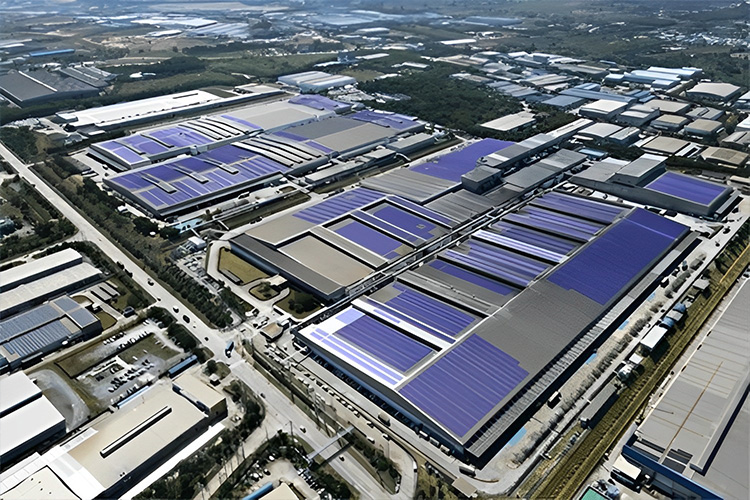

The panel is being constructed on a plant, which manufactures Falken tyres for the European market, by the Japanese company Kansai Electric Power
August 10, 2023 | Staff Reporter | Thailand | Facilities Management

Kansai Electric Power, Japan’s second largest electricity supplier, is creating what it claims to be the world’s biggest standalone rooftop solar panel installation on a factory in Thailand’s high-tech Eastern Economic Corridor. The solar panels on the plant, which manufactures Falken tyres for the European market, are reportedly equivalent in size to more than 18 football pitches. It is located in the Amata City Rayong industrial park, 135km southwest of Bangkok.
Thailand is bidding to become the leader in clean energy in Southeast Asia and, once complete, this project will mark a major milestone, Kansai reports. Together with a gas co-generation system and additional electric power fuelled by biomass from surplus rubber trees, the 40,000-panel, 100,000 sq m rooftop aims to have a total output of 22MW and to reduce CO2 emissions by 38,000 tonnes by 2025. Ultimately, it is designed to enable the factory’s owner, Sumitomo Rubber Industries, to function entirely on renewable energy.
As part of a sweeping national sustainability strategy known as the Bio-Circular Green economy, the Thai government has successfully packaged a raft of subsidies, tax breaks and other incentives to lure investors to finance and build renewable energy-related projects. “In terms of the promotional force of the country, we think Thailand is the most advanced in the Asean region,” said Katsuhisa Yamamoto, managing director of Kansai’s Thai unit. “It’s very important for our business, especially in tax benefit.”
In the first six months of 2023, 186 of 195 applications to the Thailand Board of Investment (BOI) for power generation projects were renewable energy-related. Companies seeking clean energy opportunities in Thailand span the investment spectrum, from Japanese and Korean power utilities to Chinese and European electric vehicle makers, and US technology giants such as Amazon Web Services and Western Digital Corporation.
“Climate change is the biggest agenda globally now and Asia is the epicentre of carbon emissions,” said Shuji Hashizume, a Bangkok-based principal investment specialist in the private sector operations department of the Asian Development Bank that has funded numerous green energy projects across Asia. “Thailand will likely be leading the initiative in Asean and its importance cannot be over-emphasised.”